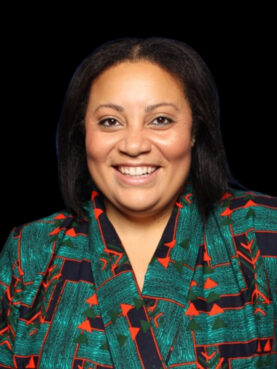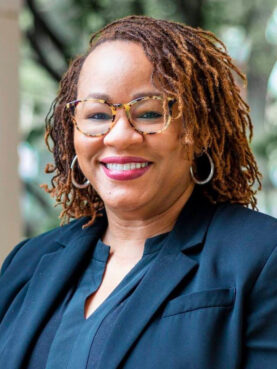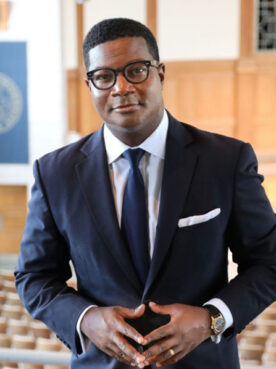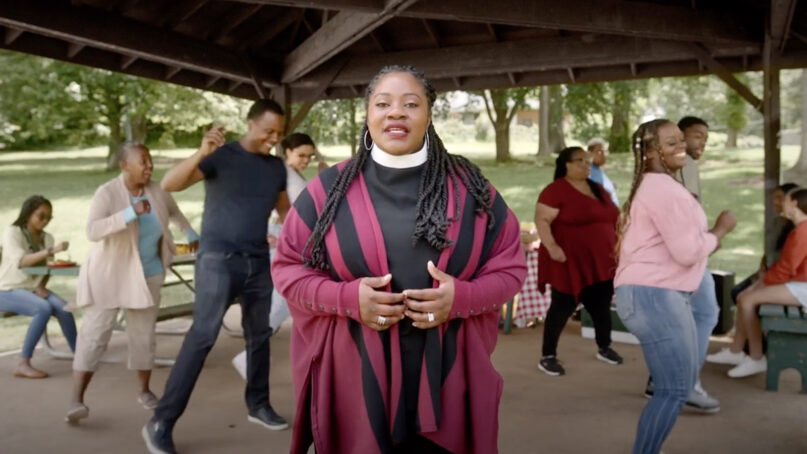(Interfaith America) — As a girl growing up in Dallas, Allison Mathews spent a lot of time in Catholic churches. The historic parishes her family called home had predominantly Black congregations, and her parents, both music ministers, founded a national conference that drew 1,000 Black Catholics to Texas each year.
Called “Unity Explosion,” the event was an empowering venue for Black Catholics to pray, sing and celebrate the many gifts they bring to the church.
In time, Mathews noticed that not everyone felt unified or celebrated. When people she loved came out as gay, she saw them struggle. Inside a community that once embraced them, some felt shunned. Mathews was frustrated — and curious.
“I started asking these questions: Why do we have so much stigma against being gay in the Black church?” Mathews said.
RELATED: Amid Black exodus, young Catholics are pushing the church to address racism
In graduate school, she turned her curiosity into a research project. “I started interviewing Black men about their experience of being pressured to be masculine,” about racism in gay-affirming spaces, and about a disease that was hitting a disproportionate number of Black men: HIV/AIDS.

Allison Mathews. Photo courtesy of WFU
“How is it that we are dying from something that is so preventable? HIV is really a symptom of larger issues of stigma, of racial discrimination, of homophobia and misogyny,” Mathews said. “I really got passionate about it.”
She followed her passion to fight stigma and raise awareness about groundbreaking HIV/AIDS treatments, working at hospitals, on clinical trials and with faith leaders.
Mathews now leads a pioneering center dedicated to combating HIV/AIDS in the South, the epicenter of a devastating — and preventable — epidemic. In 2019, the Centers for Disease Control and Prevention reported that Southern states accounted for more than half of nearly 40,000 new cases in the United States. The South had greater proportion of new HIV diagnoses (52%) than all other regions combined.
Her program is housed at a theological school — Wake Forest University School of Divinity in Winston-Salem, North Carolina. The Gilead COMPASS Faith Coordinating Center there is part of a $100 million, multipronged effort to bring down HIV infection rates and destigmatize the disease throughout the American South. It launched last year with a $5 million grant from Gilead Sciences.
Shonda Jones, a professor who is the project’s principal investigator, had a seat as the idea took shape: “Gilead brought together this powerful team of Black faith leaders and activists to talk about what would it look like to address HIV in a coordinated manner in the South. That’s when the idea of a faith coordinating center emerged.”

Shonda Jones. Photo courtesy of WFU
Jones brought deep experience at the intersection of faith and public health. She had begun working with an interfaith network and families impacted by HIV and AIDS while a divinity school student at Texas Christian University in the early 1990s.
In the earliest days, “it felt surreal,” she said. “I remember going to the hospital and visiting and there being caution tape around the door. You’d have to double up on gloves and put on head gear. There was so much ignorance even in the medical community about the virus. It was as if you were going into this contaminated space.”
In time, Jones helped establish care teams to cut through the stigma — and show love. “We brought food, sat on the bedside of patients,” Jones said. “Supporting families through prayer, we trained them to build their capacity to offer that kind of care, helping with medications, things like that.”
Jones and Mathews have seen how religion can perpetuate stigma and pain, but they believe religion can be part of a solution as well.
“Faith leaders have this long legacy of social justice advocacy in fighting for people’s human rights, but we also have to push them on HIV, unfortunately, because for the past 40 years many faith leaders have been silent,” Mathews said. “When the disease is destigmatized, people are more likely to seek out information, get support and access life-extending treatments. “We are solely focused on the intersection of HIV and faith.”
Her center funds projects at religious institutions, like an Atlanta church network that each year trains hundreds of faith leaders to talk about HIV in their communities; historically Black colleges and universities; and interfaith organizations. (IFYC, the organization I work for, is a grant recipient; the funds support campus-based efforts to destigmatize HIV and AIDS.)
The COVID-19 pandemic, as well as the growing number of people unaffiliated with any religion, is “requiring faith leaders to think beyond the walls of the church,” Mathews said. The Wake Forest project partnered with Lil Nas X, who has used music — and celebrity — to dismantle HIV stigma.

Jonathan Lee Walton. Photo courtesy of WFU
The dean of the Divinity School at Wake Forest, Jonathan Lee Walton, said the COMPASS/Gilead initiative is a perfect fit with the priorities of the institution.
“We’ve always taken health very seriously here,” Walton said, “because we understand that disease is both physical and social. Illness is physical and spiritual. And it’s one thing to train religious professionals that know how to pray with families, that’s an important competency, but we also understand the importance of training religious leaders that have an awareness of social determinants of good health.”
“I like to say, it’s one thing to pull baby Moses out of the Nile River,” Walton added. “It’s another to understand why so many baby Moseses are being put in the Nile in the first place.”
About 1 in 5 of his graduates go on to chaplaincy roles, many at hospitals, Walton said. He’s committed to graduating thoughtful, “well-trained religious leaders that aren’t peddling in toxic theologies,” he said, and to ensuring Wake Forest School of Divinity School is a leader in showing how faith leaders can help tackle public health crises, including the devastating HIV/AIDS epidemic in the South.
“There’s nothing else like this,” Jones said. “We’re able to dream big and imagine, and so we are grateful for that support.
This article first appeared on Interfaith America and is republished courtesy of Interfaith Youth Core.





